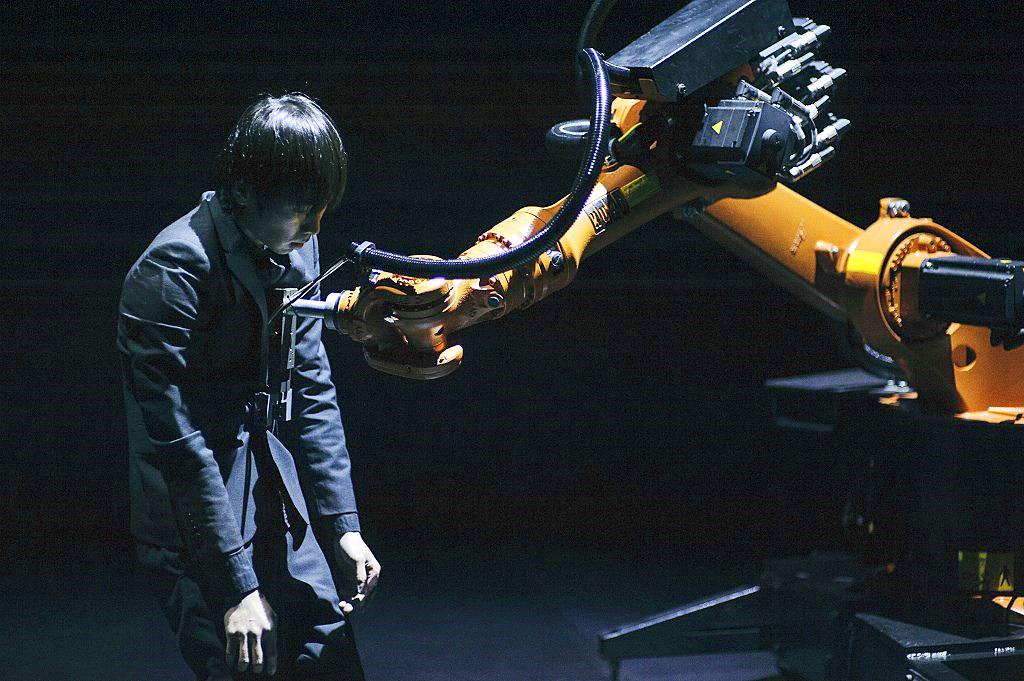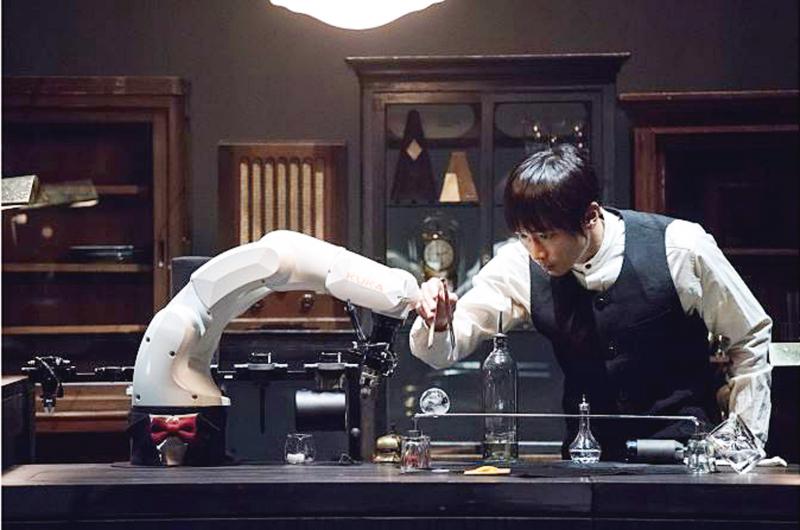After creating works involving robots for over a decade, choreographer Huang Yi (黃翊) is set to present his latest work in the spring in the form of a coffee shop set in the future.
In the upcoming production Little Ant & Robot: A Nomad Cafe, Huang further develops his dream of having robots and dancers perform together and interact with the audience, the choreographer said.
“The coffee shop is set in the future. I have been wondering about the possible interactions between people, as well as people and robots ever since I was little,” he said. “It should not be about technology replacing people in more and more areas,” said Huang, who envisages a harmonious relationship between people and robots, in which they help and support each other.

Photo: CNA
Huang, who is also a coder, first contacted German automation solution provider KUKA Robotics in 2010 and created Huang Yi & KUKA in 2012, in which he danced with a pre-programmed robotic arm that was over two meters in length.
The 2012 production has since been performed 78 times in 32 cities and 17 countries.
For his new production, which is scheduled to premiere at the National Theater in Taipei on April 23 before touring Taiwan through July, Huang uses a smaller 50-centimeter tall KUKA model.

Photo: CNA
KUKA will be programmed to serve coffee and dessert, interact with dancers, and use a drumstick to play rhythm, with some performances designed for families and children, said Huang.
Despite the fact that he is not a coffee drinker, his new work is set in a cafe and revolves around the drink — an important element in the lives of people he collaborates with — focusing on incorporating daily life into a dance piece, Huang said.
“It will be as if people can download fond memories here. There will be moments of people meeting with each other, parting, celebrating, as well as times of happiness, which are ‘saved’ in this work and can be played again and again like memories,” he said.
Apart from KUKA’s more detailed and intricate movements, Huang also mentioned the progress he is making with the new production.
“I’m very pleased that this time it is not just me writing the program,” he said, noting how every member of the production is more involved in the creative process.
For instance, one of the dancers is in charge of all technical aspects of the production, as well as designing the robot’s automation.
Huang also thanked Cloud Gate Dance Theatre founder Lin Hwai-min (林懷民) for his support, giving him lots of space and asking questions that helped clarify his ideas and taught him to be practical.
Given Lin is about 35 years his senior, Huang, who is in his late 30s, is also thinking about the role he can play for future artists, who he said are perhaps still babies now.
Huang believes 35 years is just about the time needed for an artist to make a major breakthrough in both the arts and technology.
“Then I can offer more substantial assistance,” he said, “the person [who would have my assistance] could be Taiwanese or a foreigner. I’ll wait for the individual to come to see a performance and to grow up.”
“I’ll encourage that person to have a unique voice, to contribute to the industry and to create art for his/her generation,” he said.
Little Ant & Robot: A Nomad Cafe will be staged at the National Theater April 23 to April 25, before moving to Songshan Cultural and Creative Park in Taipei for a month-long presentation in a more intimate setting in May.
The production will then move to the National Taichung Theater June 4 to June 6 and the National Kaohsiung Center for the Arts July 10 to July 11.

Towering high above Taiwan’s capital city at 508 meters, Taipei 101 dominates the skyline. The earthquake-proof skyscraper of steel and glass has captured the imagination of professional rock climber Alex Honnold for more than a decade. Tomorrow morning, he will climb it in his signature free solo style — without ropes or protective equipment. And Netflix will broadcast it — live. The event’s announcement has drawn both excitement and trepidation, as well as some concerns over the ethical implications of attempting such a high-risk endeavor on live broadcast. Many have questioned Honnold’s desire to continues his free-solo climbs now that he’s a

As Taiwan’s second most populous city, Taichung looms large in the electoral map. Taiwanese political commentators describe it — along with neighboring Changhua County — as Taiwan’s “swing states” (搖擺州), which is a curious direct borrowing from American election terminology. In the early post-Martial Law era, Taichung was referred to as a “desert of democracy” because while the Democratic Progressive Party (DPP) was winning elections in the north and south, Taichung remained staunchly loyal to the Chinese Nationalist Party (KMT). That changed over time, but in both Changhua and Taichung, the DPP still suffers from a “one-term curse,” with the

Jan. 26 to Feb. 1 Nearly 90 years after it was last recorded, the Basay language was taught in a classroom for the first time in September last year. Over the following three months, students learned its sounds along with the customs and folktales of the Ketagalan people, who once spoke it across northern Taiwan. Although each Ketagalan settlement had its own language, Basay functioned as a common trade language. By the late 19th century, it had largely fallen out of daily use as speakers shifted to Hoklo (commonly known as Taiwanese), surviving only in fragments remembered by the elderly. In

William Liu (劉家君) moved to Kaohsiung from Nantou to live with his boyfriend Reg Hong (洪嘉佑). “In Nantou, people do not support gay rights at all and never even talk about it. Living here made me optimistic and made me realize how much I can express myself,” Liu tells the Taipei Times. Hong and his friend Cony Hsieh (謝昀希) are both active in several LGBT groups and organizations in Kaohsiung. They were among the people behind the city’s 16th Pride event in November last year, which gathered over 35,000 people. Along with others, they clearly see Kaohsiung as the nexus of LGBT rights.